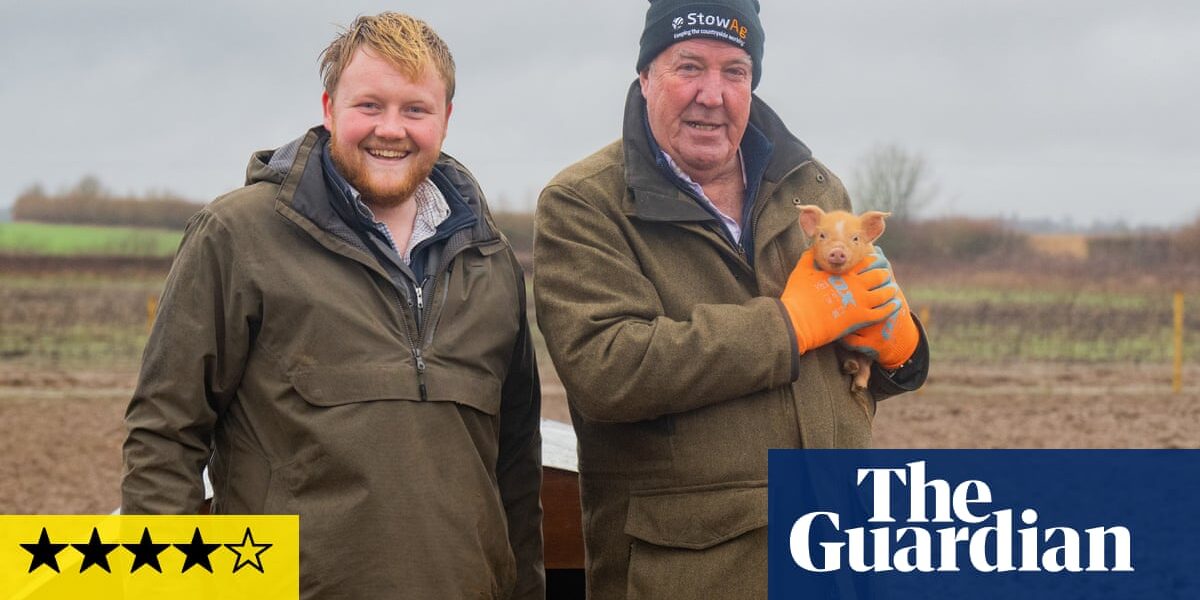Clarkson’s Farm review – Jeremy’s heartbreak at Diddly Squat will make you weep

Oh, to be in charge at Prime Video. Imagine spending $465m on a Lord of the Rings remake that hardly anyone appeared to actually enjoy, when it turns out that sticking a few cameras on a tractor while a famous curmudgeon tries to explain the impossibilities of farming in Britain today will give you the biggest show on the platform. That is, in the UK, at least. We’ll have none of your explosive charismatic movie star Mr and Mrs Smith remakes, thank you very much. We’ll take bickering with the local council about enforcement orders, novel methods of blackberry harvesting and the travails of breeding pigs at Diddly Squat farm instead.
Actually, hold that last thought, because I may still regret my emotional investment in the third season of Clarkson’s Farm. The whole series begins with a warning, in fact. “Everything that could go wrong has gone wrong,” says Clarkson, gravely. It’s the council, it’s the weather, it’s the climate, it’s the war in Ukraine. It doesn’t rain for weeks. Then it doesn’t stop raining. Things break, crops fail and animals have to go, in more ways than one. In among all that bucolic loveliness, this is a relentless and unforgiving grind.
But that is one of the many reasons this series has been so wildly popular. It gives the layperson a straight-talking account of what farming in Britain is like. Clarkson butts heads with his adviser Charlie Ireland, who knows enough about bureaucracy and red tape to tether Clarkson’s loftier ideas. Want to make jam and sell it? There are rules for that. Want to repair an old dam? There are definitely rules for that. The general pattern is familiar to anyone who has seen the previous two series. Clarkson decides he wants to try something new, much to the despair of Ireland, and the barely disguised disgust of his former assistant Kaleb Cooper, who has earned a promotion to farm manager. Clarkson tries it anyway, it causes a bit of chaos, then everyone goes on with their business.
There is a sense, though, that things feel more sober and serious this time around. The big idea holding it all together for series three is that Clarkson wants to know if he can “farm the unfarmed”. Roughly half of his 1,000 acres are given over to arable farming, while the other half consists of woodland, hedgerows and wildflower meadows. Can he make money from that side? He puts the taciturn Cooper in charge of the traditional farming, and himself in charge of the unfarmed farming, and turns it into a competition. This leaves lots of opportunity for it to devolve into farce, and it really is often very funny indeed. Cooper, in particular, has a dry wit that deflates Clarkson’s naive idealism. Just don’t put him in charge of a hovercraft.
For all of its slapstick and silliness, though, Clarkson’s Farm stealthily asks big and sometimes difficult questions. Can a farmer love their animals and also happily send them off to slaughter? There is a philosophical discussion about it. When it comes to chemical fertilisers, does long-term thinking need to be prioritised over short-term gains? In a scenario that I did not see coming, Andy Cato from Groove Armada and former T4 presenter George Lamb turn up to explain regenerative farming and offer practical solutions to ailing soil health. Do stick around to see what Cooper makes of this. It is to the credit of the show that it allows these proper conversations to take place. There aren’t many popular entertainment series that give airtime to the thorny issue of agrarian monocultures. Somehow it also manages to be highly compelling viewing. This is very well-made television, and perfectly balanced. There is serious talk, and there is a lot of titting about on tractors. Each episode ends on a proper cliffhanger. It is far too easy to watch several instalments in one greedy sitting.
Every series, Clarkson and his partner Lisa Hogan try their hand at rearing new livestock. This, reluctantly, brings me back to the pigs. Much of Clarkson’s Farm operates in a world of stiff upper lips, but there are a couple of events which cause those lips to wobble. Just as Clarkson is congratulating himself on getting over his sentimental attachment to his animals, catastrophe strikes. The episode which really gets in to the thick of their porcine woes is called, simply, Harrowing, and I have the tear-soaked tissues to prove it’s no misnomer. It’s not just me being a metropolitan wet blanket about it. Clearly, Clarkson’s Farm is a true labour of love, because there isn’t a dry eye in the pig house over there, either.
after newsletter promotion
Source: theguardian.com


